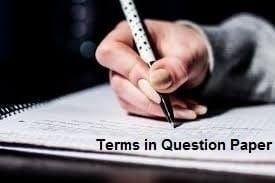
College students always get confused with terms used in question paper and sometimes they get failed in giving their best even after knowing answer. In exam hall, they are not only supposed to write whatever they know rather they also need to understand expectations of evaluators. Each word of question paper makes one outline in mind of evaluators and they look for the same in the answer. Here, we are giving various words used in question paper along with outlines which are expected to be written while attempting questions.
This article is also useful for UPSC aspirants for writing answers in UPSC Mains Question Paper.
List of multiple words used in question papers
Analyse
To analyse any topic break its constituent part and think in depth at each part. You need to give supporting arguments and evidence for the both sides of issue i.e. in pros and cons. Not only this, arguments should be interlinked to one another.
Assess
Weigh up to what extent something is true. You need to persuade the reader by citing relevant analysis however also keep in mind to illustrate any flaws and counter-arguments as well. Conclude by stating clearly how far you are in agreement with the original proposition.
Clarify
As the word suggests itself you have to create something clearer and, wherever appropriate, simplify it with examples. It is like explaining in easier terms a fancy method or theory, or the link between two variables.
Comment upon
Pick out the main points on a topic and provides your opinion, reinforcing your purpose of view using logic and reference to relevant evidence, together with any wider reading you’ve got done.
Compare
To compare, you have to establish the similarities and variations between two or more phenomena. Say if any of the shared similarities or variations is more important than others. ‘Compare’ and ‘contrast’ will often feature together in an essay question.
Consider
Write what you think and have observed regarding something. Support your comments using appropriate evidence from external sources, or your own experience. You also need to include views which are contrary to your own and the way they relate to what you originally thought.
Contrast
Similar to compare but consider the dissimilarities between two or more phenomena, or what sets them apart. Suggest any variations that are significantly important.
Critically evaluate
Give your finding on what extent a statement or findings within a piece of information are true, or to what extent you agree with them. Provide evidences taken from a wide range of sources which each agree with and contradict an argument. Reach to a final conclusion, basing your decision on what you decide to be the foremost important factors and justify how you have created your choice.
Define
To give in precise terms the meaning of something. Try to bring around attention on issues posed with the definition and completely different interpretations that may exist.
Demonstrate
Show how, with examples for instance.
Describe
Provide an in depth clarification on how and why something happens.
Discuss
Primarily this can be a written discussion where you are using your ability at reasoning, insured by carefully chosen evidence to create a case for and against an argument, or suggest the advantages and disadvantages of a given context. Keep in mind to make a conclusion.
Elaborate
To give in more detail, provide more information on.
Examine
Look in close detail and establish the key facts and necessary issues surrounding a subject. This should be a critical analysis and you should attempt to provide reasons on why the facts and issues you have identified are the foremost important.
Explain
Clarify a subject by giving an in depth account on how and why it happens, or what’s meant by the use of this term in a specific context. Your writing should have clarity so that complex procedures or sequences of events are often understood; defining key terms wherever appropriate, and is supported with relevant analysis.
Explore
Adopt a questioning approach and think about a range of different viewpoints. Wherever possible reconcile opposing views by presenting a final line of argument.
Give an account of
Means provides an elaborated description of something. Not to be confused with ‘account for’ which asks you not only what, however why something happened.
Identify
Determine what the key points to be addressed are and implications thereof.
Illustrate
A similar instruction to ‘explain’ whereby you are asked to point out the workings of something, making use of definite examples and statistics if appropriate to add weight to your clarification.
Interpret
Demonstrate your understanding of an issue or topic. This may be the utilization of specific terminology by an author, or what the findings from a piece of research suggest to you. In the latter instance, discuss any important patterns and causal relationships.
Justify
Make a case by providing a body of evidence to support your concepts and points of view. In order to present a balanced argument, think about opinions which can run contrary to your own before stating your conclusion.
Outline
Convey the main points putting stress on global structures and interrelationships rather than minute detail.
Review
Look completely into a topic. This could be a critical assessment and not simply descriptive. Show how present gives rise to something. Explain in a logical order, and with relevant evidences.
State
To specify in clear terms the key aspects relating a subject without being excessively descriptive. Refer to evidence and examples wherever applicable.
Summarise
In this type you need to provide a condensed version drawing out the main facts and omit superfluous information. Brief or general examples can usually suffice for this type of answer
To what extent
Evokes the same response to queries containing ‘How far…’. This kind of question demands assessment of the evidence in presenting your argument.

Be the first to comment